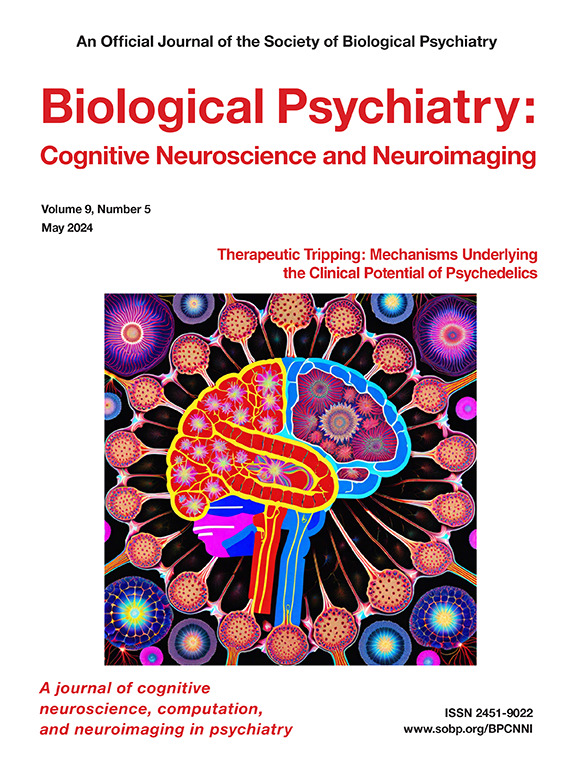ENIGMA-Meditation: Worldwide Consortium for Neuroscientific Investigations of Meditation Practices
IF 4.8
2区 医学
Q1 NEUROSCIENCES
Biological Psychiatry-Cognitive Neuroscience and Neuroimaging
Pub Date : 2025-04-01
DOI:10.1016/j.bpsc.2024.10.015
引用次数: 0
Abstract
Meditation is a family of ancient and contemporary contemplative mind-body practices that can modulate psychological processes, awareness, and mental states. Over the last 40 years, clinical science has manualized meditation practices and designed various meditation interventions that have shown therapeutic efficacy for disorders including depression, pain, addiction, and anxiety. Over the past decade, neuroimaging has been used to examine the neuroscientific basis of meditation practices, effects, states, and outcomes for clinical and nonclinical populations. However, the generalizability and replicability of current neuroscientific models of meditation have not yet been established, because they are largely based on small datasets entrenched with heterogeneity along several domains of meditation (e.g., practice types, meditation experience, clinical disorder targeted), experimental design, and neuroimaging methods (e.g., preprocessing, analysis, task-based, resting-state, structural magnetic resonance imaging). These limitations have precluded a nuanced and rigorous neuroscientific phenotyping of meditation practices and their potential benefits. Here, we present ENIGMA (Enhancing Neuro Imaging Genetics through Meta Analysis)–Meditation, the first worldwide collaborative consortium for neuroscientific investigations of meditation practices. ENIGMA-Meditation will enable systematic meta- and mega-analyses of globally distributed neuroimaging datasets of meditation using shared, standardized neuroimaging methods and tools to improve statistical power and generalizability. Through this powerful collaborative framework, existing neuroscientific accounts of meditation practices can be extended to generate novel and rigorous neuroscientific insights that account for multidomain heterogeneity. ENIGMA-Meditation will inform neuroscientific mechanisms that underlie therapeutic action of meditation practices on psychological and cognitive attributes, thereby advancing the field of meditation and contemplative neuroscience.
ENIGMA-冥想:全球冥想实践神经科学研究联盟。
冥想是古代和现代沉思式身心练习的一种,可以调节心理过程、意识和精神状态。在过去的 40 年中,临床科学已经将冥想练习手册化,并设计了各种冥想干预方法(MIs),这些方法对抑郁、疼痛、成瘾和焦虑等疾病具有疗效。在过去十年中,神经影像学研究了临床和非临床人群冥想练习、效果、状态和结果的神经科学基础。然而,目前冥想神经科学模型的普适性和可复制性仍有待建立,因为这些模型主要基于小规模数据集,在冥想的多个领域(如练习类型、冥想经验、针对的临床疾病)、实验设计和神经成像方法(如预处理、分析、任务型、静息态、结构性磁共振成像)方面存在异质性。这些局限性阻碍了对冥想练习及其潜在益处进行细致严谨的神经科学表型分析。在此,我们将介绍ENIGMA-冥想,这是首个对冥想练习进行神经科学研究的全球合作联盟。ENIGMA-Meditation 将使用共享的标准化神经成像方法和工具,对全球分布的冥想神经成像数据集进行系统的元分析和超大型分析,以提高统计能力和普适性。通过这一功能强大的合作框架,现有的冥想神经科学描述可以得到扩展,从而产生新颖而严谨的神经科学见解,并考虑到多领域的异质性。ENIGMA-冥想将为冥想实践对心理和认知属性的治疗作用提供神经科学机制信息,推动冥想和沉思神经科学领域的发展。
本文章由计算机程序翻译,如有差异,请以英文原文为准。
求助全文
约1分钟内获得全文
求助全文
来源期刊

Biological Psychiatry-Cognitive Neuroscience and Neuroimaging
Neuroscience-Biological Psychiatry
CiteScore
10.40
自引率
1.70%
发文量
247
审稿时长
30 days
期刊介绍:
Biological Psychiatry: Cognitive Neuroscience and Neuroimaging is an official journal of the Society for Biological Psychiatry, whose purpose is to promote excellence in scientific research and education in fields that investigate the nature, causes, mechanisms, and treatments of disorders of thought, emotion, or behavior. In accord with this mission, this peer-reviewed, rapid-publication, international journal focuses on studies using the tools and constructs of cognitive neuroscience, including the full range of non-invasive neuroimaging and human extra- and intracranial physiological recording methodologies. It publishes both basic and clinical studies, including those that incorporate genetic data, pharmacological challenges, and computational modeling approaches. The journal publishes novel results of original research which represent an important new lead or significant impact on the field. Reviews and commentaries that focus on topics of current research and interest are also encouraged.
 求助内容:
求助内容: 应助结果提醒方式:
应助结果提醒方式:


